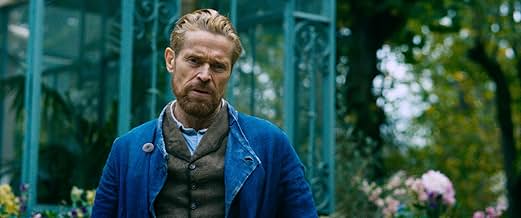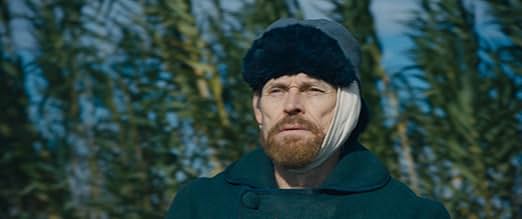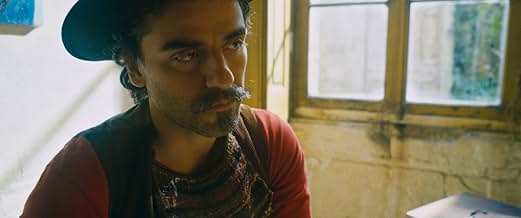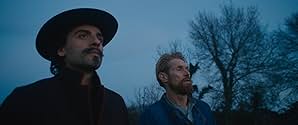Un regard sur la vie du peintre Vincent van Gogh en France à Arles et à Auvers-sur-Oise.Un regard sur la vie du peintre Vincent van Gogh en France à Arles et à Auvers-sur-Oise.Un regard sur la vie du peintre Vincent van Gogh en France à Arles et à Auvers-sur-Oise.
- Réalisation
- Scénario
- Casting principal
- Nommé pour 1 Oscar
- 3 victoires et 16 nominations au total
Clément Paul Lhuaire
- Emile Bernard
- (as Clément Lhuaire)
Alan Aubert
- Albert Aurier
- (as Alan Aubert-Carlin)
- …
Avis à la une
Vincent Van Gogh was a tortured soul that was, paradoxically, obsessed with beauty and wonder. Julian Schnabel (director) tries to give us a glimpse into the mind of the painter with this film and he delivers. This movie is not a biopic. It is more of an homage, an attempt to make us look at the world the way Vincent did.
With a dynamic camera, often hand-held, we wander around with Van Gogh (Willem Dafoe) trying to find interesting and striking images of nature, villages, people... The camera is always searching; different lenses, different angels, different distances... It finds new and inventive ways of filming. For example the split diopter is used, not to bring two objects into focus, but to blur par of the screen; and since Vincent had an eye condition, we are truly put in the artists shoes. Such a shame the movie at times loses itself in its eager to find yet another camera angle.
Sometimes a voice-over paints another image on top of what is shown. The score paints an atmosphere of ecstasy with a darker undertone. And Willem Dafoe paints an A+ performance, but he does it so well other actors sometimes disappear into his shadow.
Yet, this movie is an experience worth exploring. However it's tempo occasionally falters and instead of one long smooth stroke over the canvas, it sometimes feels more like a rough patchwork of different stories. It's sometimes messy, sometimes incredibly beautiful. Quite like Van Gogh.
This movie is not for everyone. Those who shiver when encountering vague, artsy-fartsy movies that call themselves art, better turn elsewhere. But those who can appreciate this way of filming and especially those who love Van Gogh's work, will adore this dreamlike exploration of Vincent's mind.
With a dynamic camera, often hand-held, we wander around with Van Gogh (Willem Dafoe) trying to find interesting and striking images of nature, villages, people... The camera is always searching; different lenses, different angels, different distances... It finds new and inventive ways of filming. For example the split diopter is used, not to bring two objects into focus, but to blur par of the screen; and since Vincent had an eye condition, we are truly put in the artists shoes. Such a shame the movie at times loses itself in its eager to find yet another camera angle.
Sometimes a voice-over paints another image on top of what is shown. The score paints an atmosphere of ecstasy with a darker undertone. And Willem Dafoe paints an A+ performance, but he does it so well other actors sometimes disappear into his shadow.
Yet, this movie is an experience worth exploring. However it's tempo occasionally falters and instead of one long smooth stroke over the canvas, it sometimes feels more like a rough patchwork of different stories. It's sometimes messy, sometimes incredibly beautiful. Quite like Van Gogh.
This movie is not for everyone. Those who shiver when encountering vague, artsy-fartsy movies that call themselves art, better turn elsewhere. But those who can appreciate this way of filming and especially those who love Van Gogh's work, will adore this dreamlike exploration of Vincent's mind.
This film doesn't follow the Hollywood structure. It's not a biography like you might expect, and the plot isn't defined. Instead, this is an attempt to get inside Van Gogh's head, and a brilliant one at that. Imagine being the world's greatest artist, with zero validation and constant ridicule by the establishment around you. That's the torturous state of being this film encapsulates and does it with purpose. At times, the cinema language gets more experimental than necessarily to accomplish its goal, but I commend the director for pushing the boundaries of standard filmmaking and letting us inhabit Van Gogh's mind for this brief period. I genuinely felt a loss for this escape from my own mind when Van Gogh passed. I recommend anyone involved with artistic or creative thinking to watch this film.
Loved the raw hand held camera work . The director shows the scene in such a that u can really enter into vincent's mind and can see his vision . Obviously the acting of Willem Dafoe was tremendous and he took the character to another level .
The last years of Vincent van Gogh with his extreme sensitivity and mental instability. It's perfectly filmed with a colorful and adequate staging. And Willem Dafoe plays brilliantly!
This film tackles the story of an artist creating masterpieces for later generations but not for his own. All the techniques that bothered other reviewers--the handheld camera, loud piano soundtrack, looped dialog--all emphasized a life of loneliness and ridicule that made the audience experience those emotions.
Clearly the story lacked a typical plot, not so much because it wasn't there as much as that Van Gogh's story is so well known and portrayed. I sensed that my companions may have been wishing they had chosen a different movie but for me this film further added to the tapestry of Van Gogh's unique story. Plus the film addresses the two biggest points of contention about him ... his ear and his death ... and suggests that Van Gogh's character traits have turned those into unsolvable mysteries.
Clearly the story lacked a typical plot, not so much because it wasn't there as much as that Van Gogh's story is so well known and portrayed. I sensed that my companions may have been wishing they had chosen a different movie but for me this film further added to the tapestry of Van Gogh's unique story. Plus the film addresses the two biggest points of contention about him ... his ear and his death ... and suggests that Van Gogh's character traits have turned those into unsolvable mysteries.
Le saviez-vous
- AnecdotesWillem Dafoe was 62 when the film was released, 25 years older than Vincent van Gogh, who died at age 37.
- GaffesTheo tells Vincent at the hospital that he is now married. In reality Vincent received a letter from his brother on Dec 23rd 1888, in which he announced his engagement. Vincent feared that his brother would not be able to support him, once married. Additional to this he had the argument with Gaugin that night over Paul leaving. Mentally disturbed by all this he cut his ear off.
- Citations
Vincent Van Gogh: Maybe God made me a painter for people who aren't born yet.
Priest: Possibly.
Vincent Van Gogh: It is said, Life is for sowing. The harvest is not here.
- Crédits fousThere's a mid-credits scene, where a Paul Gauguin quote is narrated.
- ConnexionsFeatured in Sven Uslings Bio: 2019 Års sämsta biofilmer (2020)
Meilleurs choix
Connectez-vous pour évaluer et suivre la liste de favoris afin de recevoir des recommandations personnalisées
- How long is At Eternity's Gate?Alimenté par Alexa
Détails
- Date de sortie
- Pays d’origine
- Sites officiels
- Langues
- Aussi connu sous le nom de
- Van Gogh en la puerta de la eternidad
- Lieux de tournage
- Sociétés de production
- Voir plus de crédits d'entreprise sur IMDbPro
Box-office
- Montant brut aux États-Unis et au Canada
- 2 294 915 $US
- Week-end de sortie aux États-Unis et au Canada
- 92 856 $US
- 18 nov. 2018
- Montant brut mondial
- 11 519 666 $US
- Durée1 heure 51 minutes
- Couleur
- Rapport de forme
- 2.35 : 1
Contribuer à cette page
Suggérer une modification ou ajouter du contenu manquant





































